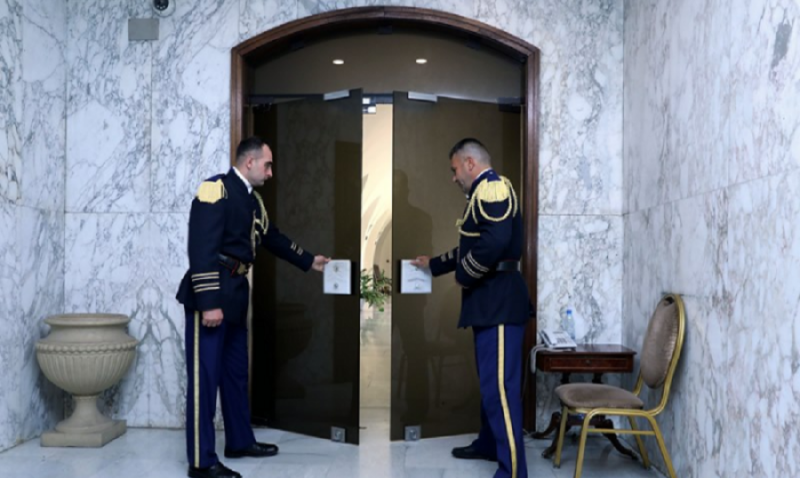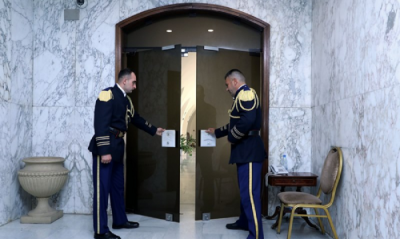The recent explosion of the "tinderbox" in Ain al-Hilweh did not surprise anyone except the Lebanese authorities, which for the second time in about 40 days adopted a policy of "taking note" and declared that what is happening "constitutes a serious insult to the state." The dangerous "fire" in the largest Palestinian refugee camp in the country (Sidon - South) has aggravated its wounds and added to its failures, disintegration of its institutions, and violation of its sovereignty, turning it into a "playground of fire." Meanwhile, both domestic and external attempts to extinguish the ongoing presidential crisis before the upcoming year, leaving Lebanon "without a head of state," continue to struggle.
"Everyone knew" that Ain al-Hilweh, which entered into a truce lasting more than a month, stands "armed" at both ends of the Fatah movement and hardline Islamic groups that refused to hand over those responsible for the assassination of prominent Fatah leader Abu Ashraf al-Armoushi (on July 30) to the Lebanese judiciary and to evacuate UNRWA schools within the camp. The "battle" is imminent, with reports indicating a kind of countdown, prompted by mobilization statements and field preparations, amid scenarios of traps feared to be the spark of what is worrying; an "octopus-like" conflict connected to regional attempts to enhance the Palestinian cause "in the pocket" and weaken the legitimacy of Palestinian leadership within Palestine.
Amid the smoke of the fierce confrontations that ignited on Thursday night with an attack by extremist groups on Fatah positions, affecting the city of Sidon and its surroundings, the death toll, as of yesterday afternoon, reached three (one from Fatah and another from the Islamic groups reportedly being Shadi Issa, the brother of wanted Nimer Issa, along with a civilian killed by stray bullets named Hussein Maqchar). This raised fears that what is happening in Ain al-Hilweh has a broader "operational stage."
While informed sources did not hesitate to express fears that there might be "someone who pressed the detonator" at a time when "demarcation lines" that had long been respected for areas concentrated by extremist groups were removed, the Palestinian ambassador in Beirut, Ashraf Dabbour, announced (shortly after al-Armoushi's assassination) that "there are communications with external parties and that they operate within their agenda to undermine the stability of the camp." The official Lebanese response, amid fears of an escalation, was limited to "complaining," as expressed in the communication from Prime Minister Najib Mikati to Palestinian President Mahmoud Abbas. It is noteworthy that the events in Ain al-Hilweh, in their initial round, were a key reason for the Gulf Cooperation Council to call its citizens either to leave Lebanon immediately or to avoid traveling there.
Mikati emphasized the "priority of stopping military operations and cooperating with the Lebanese security apparatus to address the ongoing tensions," stating that "what is happening does not serve the Palestinian cause at all and constitutes a severe insult to the Lebanese state in general, especially to the city of Sidon that hosts Palestinian brothers." He added that "it is necessary for them to deal with the Lebanese state according to its laws and regulations and to ensure the safety of its citizens."
The roar of the battles in Ain al-Hilweh did not overshadow the efforts, both local and external, to find an exit for the presidential crisis, amid President Nabih Berri's suspension of his initiative to gather Lebanese parties around a dialogue table for seven consecutive days, followed by consecutive election sessions, after it had been subjected to "political bombardment" from most of the opposition and unexpected "sniping" from the "Free Patriotic Movement," which revived a "clash" between it and Berri’s team, not clear if it was "connected" to the outcomes of direct dialogue ongoing between the Movement and "Hezbollah" regarding the presidential file.
As attention in Beirut yesterday turned to discussions between Saudi Crown Prince Mohammed bin Salman and French President Emmanuel Macron in India on the sidelines of the G20 summit, where the Lebanese file was present ahead of an expected meeting in Paris between Royal Court advisor Nizar al-Alula and French envoy Jean-Yves Le Drian, prior to his transfer to Beirut for meetings with Lebanese parties on Tuesday, focus remained on the meeting that took place recently between the Army Commander General Joseph Aoun and the head of the parliamentary bloc of "Hezbollah," Mohammad Raad.
"Al-Rai" learned from reliable sources that this meeting reflected the appreciation that "Hezbollah" leadership has for the experience of the Army Commander at the head of the military institution, despite its understanding of the good relationship between General Aoun and the Americans. The sources informed "Al-Rai" that during the meeting "Hezbollah" praised the "covert" candidacy of the Army Commander for the presidency and communicated that it considers him a "serious candidate, not secondary," but the party desires to know the options of the others before any public transition to "Plan B."
These sources noted that any public emergence of "Plan B" will certainly be before the end of the current year (i.e., before the Army Commander is retired in January 2024) "especially as the French initiative led by Le Drian encounters significant Lebanese obstacles."
The sources did not rule out that the announcement of the mission's end for Le Drian, who arrives in Beirut tomorrow for the third time, may coincide with Qatar (one of the five countries around Lebanon) placing the candidacy of the Army Commander for the presidency seriously on the table, potentially allowing for internal dynamics to support this option, which could break the negative equilibrium governing the Lebanese parliament.
These sources believed that President Nabih Berri (a partner of Hezbollah in the Shiite duo) would not be far from the option of supporting the Army Commander's candidacy for the presidency after realizing the impossibility of securing a political-parliamentary quorum to elect Sleiman Frangieh, especially in light of the opposition from the two largest Christian blocs against his presidency.
The same sources assessed that the ongoing dialogue between "Hezbollah" and the "Free Patriotic Movement" led by Gebran Bassil is unlikely to lead to a presidential understanding or to a break in the relationship between the two parties, which will leave the parliamentary game to choose the president who enjoys the required majority.
It was understood from these sources that Bassil cannot hold "Hezbollah" accountable for the presidential schism, firstly because the party fulfilled its obligations by bringing General Michel Aoun to the presidency, secondly because it recognizes the implications of responding to Bassil's conditions, and thirdly because it does not have influence over Berri or any of his allies regarding voting directions for the presidency.
The reliable sources told "Al-Rai" that "Hezbollah," which intends to support the Army Commander's candidacy for the presidency, may not vote for him to maintain the relationship with Bassil. It views the current public American support and the support of some regional parties for General Aoun as not detrimental and possibly beneficial in breaking Lebanon's isolation.




